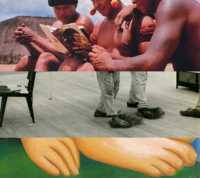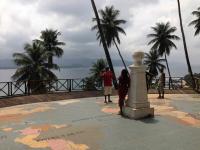postcoloniality
Articles tagged with postcoloniality
Tag Archive
- 27 de Maio de 1977
- Abderrahmane Sissako
- acid house
- activism
- Alqueva
- Ana Clara Guerra Marques
- angolan art
- angolan fashion
- arte
- artist
- Bahia
- Baía
- Berlim
- biblioteca
- Boca Fala Tropa
- Cacau
- Cape Verde
- Cartum
- cc
- Chomsky
- Cidade do Cabo
- colonial memory
- communality
- Congo
- Cuba
- cultures
- curator
- dance
- democracia
- descolinizar museus
- Dictatorship
- Djaimila Pereira de Almeida
- djaimilia pereira de almeida
- édouard glissant
- EUA
- Euridice Kala
- european union
- Exhibition-Fair Angola 1938
- exílio
- femini
- Fernando Anuang´a
- forced migration
- fotografia
- Geo-archaeological research
- George Floyd
- German filmmaker
- Gilberto Freyre
- hegemony
- história
- historicism
- ideologia
- inclusão
- interculturalidade
- Jomo Fortunato
- journalism
- jungle
- Lagos
- Leila Kilani
- liberation
- literatura brasileira
- livros
- menstruation
- middle-class
- migrações
- opinião
- Pancho Guedes
- pandemic
- Panorama
- percepção
- performs
- polémica
- police violence
- política
- portland
- Portuguese Colonialism
- post-memory
- postcolonial
- postcoloniality
- racist
- radio
- representação
- representações
- RESTITUTING ARTWORKS
- restitution
- return
- Romuald Hazoumé
- Samir Amin
- Sara Chaves
- series
- silence song
- Slavery
- south african
- story
- subjectividade
- Sudan
- Swahili
- Teaching
- the end
- USA
- “Pessoa
 In Europe and the United States, there is also the specific return to colonial form and nostalgia. In Portugal, I’ve been struck by the visible presence of what are still referred to as the “explorers” or the “discoveries,” rather than “colonizers” and “encounter.” The depiction of African bodies in official art and monuments is often stereotyped, almost degrading. I don’t see this, unfortunately, as an exception but as an example of the new divisions. Universities set a poor example here, with minorities and people of color being systematically underrepresented on both sides of the Atlantic.
In Europe and the United States, there is also the specific return to colonial form and nostalgia. In Portugal, I’ve been struck by the visible presence of what are still referred to as the “explorers” or the “discoveries,” rather than “colonizers” and “encounter.” The depiction of African bodies in official art and monuments is often stereotyped, almost degrading. I don’t see this, unfortunately, as an exception but as an example of the new divisions. Universities set a poor example here, with minorities and people of color being systematically underrepresented on both sides of the Atlantic.  Art has always been able to gather critical tools of action from different contexts of knowledge in order to intervene in institutions, politics, and social problems. This makes it a privileged place to find new strategies for empistemodiversity. At the same time, art has always maintained a strict border between itself and popular culture, to ensure that art is on the same level as the Western sciences. What if this border disappeared? How do we construct a new language that uses popular knowledge not as a theme for contemporary art, but as a spark for creating new regimes of representation and new structures of thought? How can contemporary art contribute to the learning of epistemodiversity?
Art has always been able to gather critical tools of action from different contexts of knowledge in order to intervene in institutions, politics, and social problems. This makes it a privileged place to find new strategies for empistemodiversity. At the same time, art has always maintained a strict border between itself and popular culture, to ensure that art is on the same level as the Western sciences. What if this border disappeared? How do we construct a new language that uses popular knowledge not as a theme for contemporary art, but as a spark for creating new regimes of representation and new structures of thought? How can contemporary art contribute to the learning of epistemodiversity?  I will begin by reviewing two contrastive approaches in the anthropological and neighboring literatures on Latin America: the postcolonial and the multiple modernities perspectives. It then discusses the possible place(s) of Brazilian classic nation-building literature in these debates, putting forth an argument for the need for substantial historical embedding when addressing the postcolonial in relation to Brazil. It concludes with remarks based on ongoing ethnographic research about contemporary South-South cooperation between Brazil and the African continent.
I will begin by reviewing two contrastive approaches in the anthropological and neighboring literatures on Latin America: the postcolonial and the multiple modernities perspectives. It then discusses the possible place(s) of Brazilian classic nation-building literature in these debates, putting forth an argument for the need for substantial historical embedding when addressing the postcolonial in relation to Brazil. It concludes with remarks based on ongoing ethnographic research about contemporary South-South cooperation between Brazil and the African continent. 